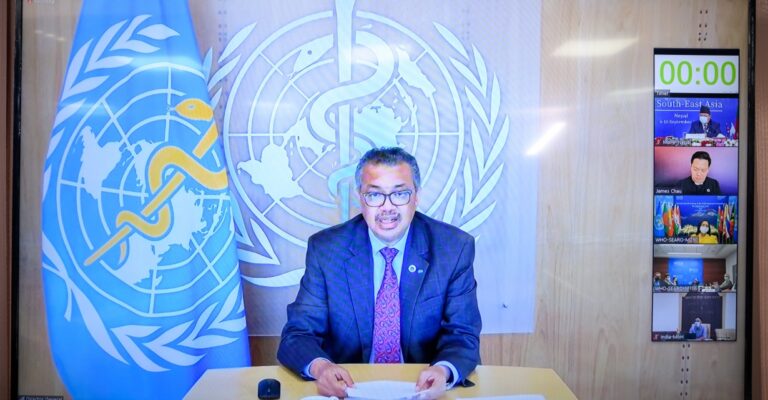
Taking lessons from the ongoing pandemic and emphasizing a once-in-a-century opportunity, countries of WHO South-East Asia Region have adopted a Ministerial Declaration resolving to strengthen health system resilience to ensure health security, and achieve universal health coverage and Sustainable Development Goals for health.
“Strong health systems that are primary health care-oriented, and which leave no one behind, create populations that are healthier, more productive and financially secure. Resilient health systems are the bedrock of emergency preparedness and response, and ensure that when acute events occur, essential health services can be maintained,” said Dr Poonam Khetrapal Singh, Regional Director, WHO South-East Asia, at an ongoing ministerial round table during the Seventy-Fourth Regional Committee meeting being held in Nepal.
In his opening remarks at the meeting, WHO Director-General Tedros Adhanom Ghebreyesus lauded Nepal’s efforts in the face of this extremely challenging time, and said that he was glad to see cases and deaths declining in the country.
“I commend the government for its efforts to strengthen epidemic response systems, including laboratory capacity, risk communication and case management. I also commend Nepal for its efforts to continue essential health services during the pandemic, including immunization campaigns for polio, measles and rubella, vaccinating millions of children,” said Ghebreyesus.
“I’m pleased to see that 15 percent of Nepal’s population has been fully vaccinated, and that you aim to reach 40 percent by the end of this year, in line with WHO’s global targets. We are committed to supporting you in these efforts.”
“But as the experience with this pandemic shows, no country can let down its guard. Complacency can be as dangerous as the virus itself. We must continue to be vigilant.”
Through the Declaration adopted at the ministerial round table, member countries, including Nepal, committed to provide political leadership and accountability to advance health security and progress towards universal health coverage and the health-related SDGs.
The member countries resolved to reorient health systems towards comprehensive primary health care through increased public investments, as the foundation for strengthening both public health emergency capabilities and achievement of universal health coverage.
“The pandemic has highlighted the urgency and importance of investment in human resource for health, especially at the primary health care level, and the need for adequate supply of affordable, effective, quality and safe medical products to ensure an effective response to public health emergencies and to build resilient health systems,” the Regional Director said.
The Declaration also commits to closer engagement with and the empowerment of communities to maintain the delivery of essential health services and public health programmes during and after the pandemic.
To roll-out effective response for at-risk and affected communities, member countries agreed to ensure integration of public health emergencies and disaster risk management strategies, as well as strengthening surveillance and preparedness capacity at the primary health care level.
Member countries additionally resolved to accelerate integration of noncommunicable diseases including mental health, and other programmes, at the primary health care level, as well as establishing national quality standards for primary health care services and ensuring access to quality health services during the pandemic and recovery phase.
The member countries further agreed to appropriately leverage the potential of traditional systems of medicine, while optimizing innovations in digital health technologies.
The declaration emphasized the importance of leveraging additional resources and partnerships, including the important role of WHO, to support the development of national capacities to address public health emergencies and ensure the delivery of high-quality health services for all.
“Together we are stronger. Together we can build back better essential health services, for a fairer, healthier and more health-secure future for all, leaving no one behind,” the Regional Director said.






